oney on college? Andwhy are we so unhappy about it? We all seem to agree that a college education is wonderful, and yet strangely we worry when we see families investing so much in this supposedly essential good. Maybe its time to ask a question that seems almost sacrilegious (大不敬) : is all this investment in college education really worth it? B. The answer. I fear, is no. For an increasing number of kids, the extra time and money spent pursuing a college diploma will leave them worse off than they were before they set foot on campus. C.For my entire adult life, a good education has been the most important thing for middle-class households. My parents spent more educating my sister and me than they spent on their house, and theyre not the only ones.., and, of course, for an increasing number of families, most of the cost of their house is actually the cost of living in a good school district. Questioning the value of a college education seems a bit like questioning the value of happiness, or tim. D.The average price of all goods and services has risen about 50 percent. But the price of a college education has nearly doubled in that time. Is the education that todays students are getting twice as good? Are new workers twice as smart? Have they become somehow massively more expensive to educate? E .Perhaps a bit. Richard Vedder, an Ohio University economics professor, says, "I look at the data, and I see college costs rising faster than inflation up to the mid-1980s by 1 percent a year. Now I see them rising 3to 4 percent a year over inflation. What has happened? The federal government has started dropping money out of airplanes. " Aid has increased, subsidized (补贴的) loans have become available, and "the universities have gotten the money. " Economist Bryan Caplan, who is writing a book about education, agrees: "Its a giant waste of resources that will continue as long as the subsidies continue. " F.Promotional literature for colleges and student loans often speaks of debt as an "investment in yourself. " But an investment is supposed to generate income to pay off the loans. More than haft of all recent graduates are tmemployed or in jobs that do not require a degree, and the amount of student- loan debt carried by households has increased more than five times since 1999. These graduates were told that a diploma was all they needed to succeed, but it wont even get them out of the spare bedroom at Mom and Dads. For many, the most visible result of their four years is the loan payments, which now average hundreds of dollars a month on loan balances in the tens of thousands. G.Its true about the money--sort of. College graduates now make 80 percent more than people who have only a high-school diploma, and though there are no precise estimates, the wage premium (高出的部分) for an outstanding school seems to be even higher. But thats not true of every student. Its very easy to spend four years majoring in English literature and come out no more employable than you were before you went in. Conversely, chemical engineers straight out of school can easily make almost four times the wages of an entry-level high-sch0ol graduate. H. James Heckman, the Nobel Prize-winning economist, has examined how the returns on education break down for individuals with different backgrounds and levels of ability. "Even with these high prices, youre still finding a high return for individuals who are bright and motivated," he says. On the other hand, "if youre not college ready, then the answer is no, its not worth it. " Experts tend to agree that for the average student, college is still worth it today, but they also agree that the rapid increase in price is eating up more and more of the potential return. For borderline students, tuition (学费) rise can push those returns into negative territory. I. Everyone seems to agree that the government, and parents, should be rethinking how we invest in higher education-and that employers need to rethink the increasing use of college degrees as crude screening tools for jobs that dont really require college skills, "Employers seeing a surplus of college graduates and looking to fill jobs are just adding that requirement," says Vedder. "In fact, a college degree becomes a job requirement for becoming a bar-tender. " J. We have started to see some change on the fmance side. A law passed in 2007 allows many students to cap their loan payment at 10 percent of their income and forgives any balance after 25 years. Bnt of course, that doesnt control the cost of education; it just shifts it to taxpayers. It also encourages gradimtes to choose lower-paying careers, which reduces the financial return to education still further. "Youre subsidizing people to become priests and poets and so forth," says Heckman. "You may think thats a good thing, or you may not. " Either way it will be expensive for the government. K. What might be a lot cheaper is putting more kids to work. Caplan notes that work also btfilds valuable skills--probably more valuable for kids who dont naturally love sitting in a classroom. Heckman agrees wholeheartedly:" People are different, and those abilities can be shaped. Thats what weve learned, and public policy should recognize that. " L. Heckman would like to see more apprenticeship-style. (学徒式) programs, where kids can learn in the workplace learn not just specific job skills, but the kind of "soft skills," like getting to work on time and getting along with a team, that are crucial for career success, "Its about having mentors (指导者) and having workplace-based education," he says. "Time and again Ive seen examples of this kind of program working. " M. Ah, but how do we get there from here? With better public policy, hopefully, but also by making better individual decisions. "Historically markets have been able to handle these things," says Vedder, "and I think eventually markets will handle this one. ff it doesnt improve soon, people are going to wake up and ask, Why am I going to college?" Caplan suggests that kids who dont love school go to work,
An increasing number of families spertd more money on houses in a good school district,
Subsidized loans to college students are a huge waste of money, according to one economist.
More and more kids find they fare worse with a college diploma,
For those who are not prepared for higher education, going to College is not worth it.
Over the years the cost of a college education has increased almost by 100%.
A law passed recently allows many students to pay no more than one tenth of their income for their college loans.
Middle-class Americans have highly valued a good education.
More kids should be encouraged to participate in.programs where they can learn not only job skills but also social skills.
Over fifty percent of recent college graduates remain unemployed or unable to fred a suitable job.
请帮忙给出每个问题的正确答案和分析,谢谢!
 重要提示:
请勿将账号共享给其他人使用,违者账号将被封禁!
重要提示:
请勿将账号共享给其他人使用,违者账号将被封禁!
 更多“根据以下内容回答下列各题 Is College a Worthy Investment? A.Why are we spending so much m”相关的问题
更多“根据以下内容回答下列各题 Is College a Worthy Investment? A.Why are we spending so much m”相关的问题
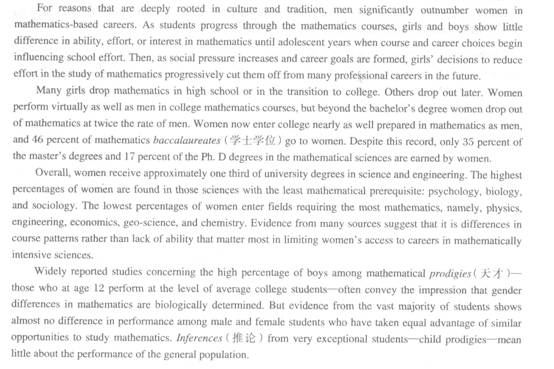 According to the author, the learning abilities of males and females in mathematics are similar until they
According to the author, the learning abilities of males and females in mathematics are similar until they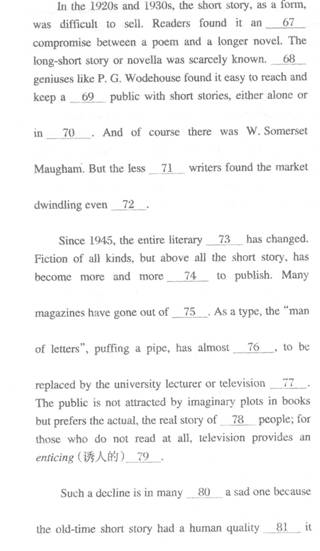
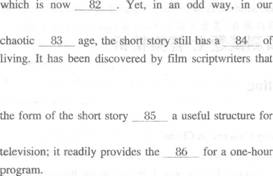


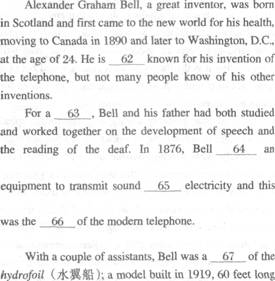
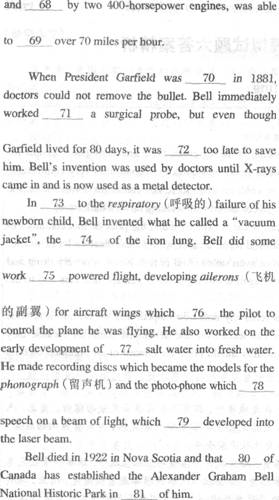

 警告:系统检测到您的账号存在安全风险
警告:系统检测到您的账号存在安全风险
